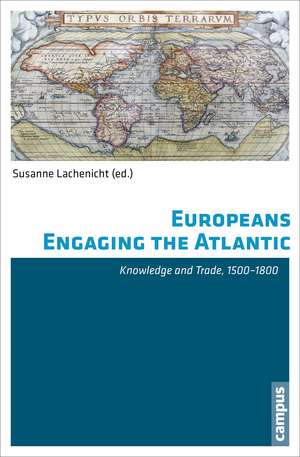Europeans Engaging the Atlantic: Knowledge and Trade, 1500-1800
Editat de Susanne Lachenichten Limba Engleză Paperback – 5 mar 2015
Europeans Engaging the Atlantic offers innovative perspectives on historical European knowledge concerning the “New World” and on trade and commerce therewith. In so doing, it enhances our understanding of how, when, and why early modern Europeans made sense of the Atlantic world, and how they tried to connect with Atlantic trade and commerce. Featuring case studies that discuss these issues from the sixteenth to the eighteenth centuries, this volume explores both the degree to which the Atlantic was (or was not) part of the European worldview—or just one part of a worldview with many centers of interest—and how European engagement with the Atlantic world evolved.
Preț: 310.66 lei
Preț vechi: 399.61 lei
-22% Nou
Puncte Express: 466
Preț estimativ în valută:
59.44€ • 61.94$ • 49.22£
59.44€ • 61.94$ • 49.22£
Carte indisponibilă temporar
Doresc să fiu notificat când acest titlu va fi disponibil:
Se trimite...
Preluare comenzi: 021 569.72.76
Specificații
ISBN-13: 9783593501703
ISBN-10: 3593501708
Pagini: 185
Ilustrații: 10 sw.-Abbildungen
Dimensiuni: 140 x 213 x 15 mm
Greutate: 0.24 kg
Editura: CAMPUS VERLAG
Colecția Campus Verlag
ISBN-10: 3593501708
Pagini: 185
Ilustrații: 10 sw.-Abbildungen
Dimensiuni: 140 x 213 x 15 mm
Greutate: 0.24 kg
Editura: CAMPUS VERLAG
Colecția Campus Verlag
Notă biografică
Susanne Lachenicht is professor of early modern history at the University of Bayreuth, Germany. She is coeditor of Diaspora Identities: Exile, Nationalism and Cosmopolitanism in Past and Present, also published by Campus Verlag.
Recenzii
"Lachenicht’s edited collection examines the relationship between Europe and the Atlantic World during the early modern period. In an attempt to balance out the plethora of studies that center on American, British, Spanish, French, and Dutch impacts in the Caribbean, the essays in this volume focus on European regions and peoples that at first glance seem to have had little impact and interaction with the Atlantic World. . . . The collection makes a strong case that different 'Atlantic Worlds' existed in the minds of Europeans, but that by the mid-eighteenth century a more stable and acknowledged understanding of the region emerged. . . . By moving the lens to lesser-known actors, Lachenicht has provided a fuller picture of the Atlantic World as a field of study and analysis. . . . Highly recommended."
